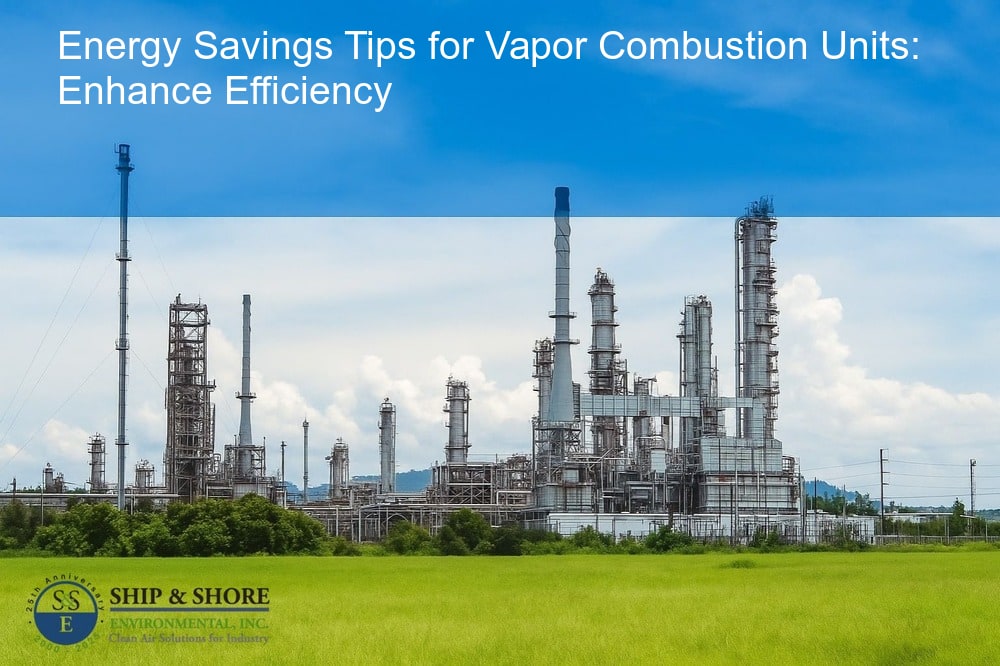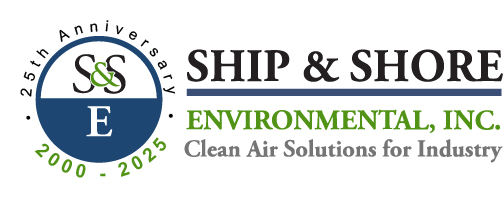
Maximizing Efficiency: Energy Savings Tips for Vapor Combustion Units
November 12, 2025 4:56 amUnderstanding Vapor Combustion Units (VCUs): An Overview
At Ship & Shore Environmental, Inc., we recognize the crucial role energy efficiency plays in the operational effectiveness of Vapor Combustion Units (VCUs). Our industry thrives on optimized energy consumption, and we strive to bring forward pertinent energy saving tips for vapor combustion units to help you achieve better performance. Vapor Combustion Units, key components in industrial settings, are designed to safely and efficiently destroy volatile organic compounds (VOCs) and hazardous air pollutants (HAPs) via combustion.
Importance of Energy Efficiency in VCUs
The significance of energy efficiency in VCUs cannot be overstated. Enhanced energy efficiency not only decreases operational costs but also extends equipment lifespan, improves process reliability, and significantly reduces environmental impact. Efficient VCUs operate with lower energy consumption, which in turn lowers the greenhouse gas emissions associated with their usage. This reflects positively on both corporate sustainability goals and regulatory compliance standards.
Objective: Energy Saving Tips for Vapor Combustion Units
Our primary objective with this guide is to provide actionable and effective energy saving tips for vapor combustion units. By focusing on practical steps and advanced techniques, we aim to empower our clients to optimize their VCUs for maximum efficiency. These tips cover a range of aspects, from regular inspection and maintenance practices to the adoption of the latest technologies, ensuring that our solutions cater to the comprehensive needs of the industry.
Regular Inspection and Maintenance: The Key to Unit Efficiency
Proper and routine maintenance is essential to ensure that vapor combustion units (VCUs) operate efficiently. Regular inspections can help identify issues before they become significant problems, contributing to optimal energy use and performance. For example, wear and tear on burners and other components can reduce efficiency, leading to higher energy consumption. By conducting periodic maintenance, we can replace or repair damaged parts, thus maintaining the unit’s optimal functionality.
Equally important is the calibration of control systems. Accurate calibration ensures that the VCU operates at its best efficiency points. This not only saves energy but also extends the lifespan of the unit. In addition, proper lubrication of moving parts reduces friction and energy loss, further contributing to overall efficiency.
Utilizing Advanced Technologies: Automated Controls and Specific Energy Consumption (SEC) Techniques
Advances in technology have made it easier and more efficient to manage VCUs. Automated control systems offer precision and reliability that manual systems can’t match. These automated systems adjust parameters in real-time, ensuring optimal operating conditions. For instance, automation can control fuel and air mixtures to achieve complete combustion, reducing fuel waste. Incorporating automation technology is a substantial energy savings tip for vapor combustion units.
Another advanced technique is the use of Specific Energy Consumption (SEC) metrics. By monitoring SEC, we can identify inefficient operations and target areas for improvement. SEC provides valuable insights into the energy consumption per unit of output, allowing us to fine-tune processes to enhance energy efficiency.
Good Practices: Optimal Operating Parameters and Waste Heat Recovery
Maintaining optimal operating parameters is essential for energy-efficient VCU operation. For example, operating the unit within the recommended temperature range ensures complete combustion and reduces excess fuel consumption. It is also important to maintain appropriate pressure levels to ensure efficient fuel atomization and combustion. Ensuring the VCU operates within these parameters can significantly reduce energy use.
Furthermore, waste heat recovery is a vital practice for improving energy efficiency. By capturing and reusing waste heat, we can reduce the overall energy demand for the VCU. Implementing heat recovery systems can turn waste heat into useful energy, such as preheating combustion air or feedwater.
- Install automated controls for precise adjustments
- Monitor Specific Energy Consumption (SEC) regularly
- Maintain optimal temperature and pressure levels
- Implement waste heat recovery systems
- Conduct frequent inspections and perform timely maintenance
Adopting these good practices will not only improve the efficiency of VCUs but also result in substantial cost savings. By focusing on optimal operating parameters and integrating advanced technologies, we are setting ourselves up for a more energy-efficient and cost-effective operation.
Did you know that regular inspection and maintenance of Vapor Combustion Units (VCUs) are crucial for ensuring unit efficiency and energy savings?
Reflecting on Our Path: Enhancing VCU Energy Efficiency
In our journey towards maximizing the performance of vapor combustion units, we’ve identified several critical steps that can significantly enhance energy efficiency. The key highlights revolve around regular inspection and maintenance, the integration of advanced technologies, and the adoption of best practices. By focusing on these areas, we ensure that our VCUs operate at optimum efficiency, thereby reaping both economic and environmental benefits.
Vital Steps to Improve Energy Efficiency in VCUs
The first step in our energy-saving strategy is a commitment to regular inspection and maintenance. This practice not only ensures that our VCUs remain in top condition but also helps us identify and address potential issues before they escalate into costly problems. Routine checks and timely maintenance enable us to prevent energy losses, which directly translate into cost savings and improved operational performance.
Incorporating advanced technologies such as automated controls and specific energy consumption (SEC) techniques is another crucial aspect of our approach. These technologies allow for precise monitoring and adjustment of operating conditions, ensuring that our vapor combustion units run at peak efficiency. By leveraging these innovations, we can achieve significant energy savings while maintaining the reliability and safety of our operations.
Adopting good practices is equally essential. This includes maintaining optimal operating parameters and implementing waste heat recovery systems. By fine-tuning our operational settings and recovering heat that would otherwise be wasted, we can further enhance the energy efficiency of our VCUs. These practices, combined with a proactive maintenance routine and advanced technological tools, form a comprehensive strategy for achieving and sustaining energy efficiency.
Impact: Reduced Operational Costs and Environmental Benefits
Implementing these vapor combustion energy-saving tips for vapor combustion units has far-reaching benefits. Financially, we stand to gain from reduced operational costs as a direct result of our energy efficiency measures. The cost savings achieved through lower energy consumption and minimized maintenance expenses contribute to the overall profitability of our operations.
Equally important are the environmental benefits. By optimizing the energy efficiency of our vapor combustion units, we reduce our carbon footprint and contribute to a cleaner, more sustainable environment. This aligns with our commitment to environmental stewardship and responsible operational practices.
Moving Forward: Committing to Regular VCU Energy Efficiency Practices
As we look ahead, it’s clear that maintaining a focus on energy efficiency is crucial. By consistently applying the energy savings tips for vapor combustion units, we can ensure that our operations remain efficient, cost-effective, and environmentally friendly. Our continued commitment to regular inspection, technological integration, and good practices will help us sustain and enhance the performance of our VCUs for years to come. Together, we can achieve operational excellence while making a positive impact on our planet.
FAQ
How important is regular maintenance for the energy efficiency of Vapor Combustion Units (VCUs)?
Maintaining regular inspection and maintenance routines is essential for the energy efficiency of VCUs. By conducting routine checks, we can promptly identify and address any issues, minimizing potential energy losses and contributing to substantial cost savings. Consequently, we ensure that our VCUs function at their highest efficiency and prevent energy wastage, thereby optimizing operational performance.
Can the integration of advanced technology significantly impact VCU energy consumption?
Undoubtedly, the integration of advanced technology, such as automated controls and specific energy consumption techniques, can have a significant impact on reducing VCU energy consumption. These technologies enable precise regulation of operating conditions and result in enhanced efficiency. As a result, we can achieve marked energy savings while maintaining high standards of reliability and safety.
What good practices can be employed to improve the operational efficiency of VCUs?
Good practices such as setting optimal operational parameters and implementing waste heat recovery systems are crucial for improving operational efficiency. By fine-tuning these parameters and utilizing the recovered heat, energy efficiency can be further enhanced. Furthermore, these practices, in conjunction with a robust maintenance program and advanced technological solutions, collectively represent a comprehensive approach toward energy conservation in vapor combustion operations.
How do energy-efficient VCUs contribute to environmental sustainability?
Energy-efficient VCUs contribute significantly to environmental sustainability by reducing the carbon footprint associated with vapor combustion processes. These units consume less energy, leading to fewer emissions and promoting a cleaner environment. Consequently, by prioritizing energy efficiency, we not only fulfill our commitment to environmental responsibility but also support broader ecological conservation goals.
What is the long-term impact of committing to energy efficiency practices for VCUs?
Committing to energy efficiency practices for VCUs has a lasting impact on our operations. By persistently employing energy conservation tips and strategies, we can maintain efficient, cost-effective operations that benefit the environment. This sustained approach underlines our dedication to achieving operational excellence and supporting the well-being of our planet, ensuring a positive legacy for future generations.
Categorised in: Blog

